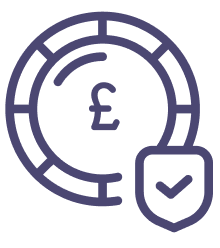No.3 Siskin Drive, Coventry, CV3 4FJ
Opening Hours: 8:30am - 05:30pm
Income protection pays a proportion of your lost earnings, which could help cover your monthly outgoings such as covering debt repayment, bills and other costs.
With income protection, you can continue to meet your financial commitments if you are forced to take an extended break from work.
Income protection is especially useful for people working in dangerous industries who want to be sure their finances, such as a mortgage, will always be covered.
The amount of income you are allowed to claim will not replace the exact amount of money you were earning before you had to stop work. You can expect to receive about a half to two-thirds of your earnings before tax from your normal job. This is because some money will be taken off for the potential state benefits you can claim, and also the income you get from the policy is tax free.
You can’t claim income protection payments straightaway if you fall ill or become disabled. You usually have to wait a minimum of four weeks but payments can start up to two years after you stop work. This is because you may not need the money straightaway as you may get sick pay from your employer or you may be able to claim statutory sick pay for up to 28 weeks after you stop work.

What you’re actually covered for depends on the type of income protection policy you take out. How long you’re covered for also depends on the type of policy and insurance provider you choose.
 Do you need income protection insurance?
Do you need income protection insurance? Sickness, injury and redundancy can suddenly impact your income. These circumstances can quickly affect peoples savings you’ve managed to build, with your mortgage or rent, utilities, food and travel still to pay. Income protection insurance could give you the security of a regular income so that, if something happens, your monthly outgoings are covered.
For more information, talk to our team of Experts
Income protection should not be confused with Payment Protection Insurance (PPI). PPI, only covers a specific debt if you’re unable to work because of injury, illness or unemployment. For example, it could cover your credit card, mortgage or loan repayments. Income protection gives you a tax-free monthly income that you can use as you would your regular income.
If you’re self-employed, you won’t be entitled to typical employee benefits, like sick pay or redundancy pay, so income protection is something you should consider. It can give you the peace of mind that you’re financially protected if you’re unable to work.
With most policies you usually have to wait at least three months after you stop work for payments to start. This is called the deferred period, or waiting period. Some deferred periods last up to two years. You have a choice of deferred periods. This is usually done to match sick pay and the longer the deferred period the more affordable the premium is. For example, if you have six months of sick pay, then you would set your deferred period to six months.